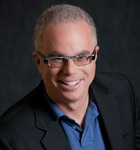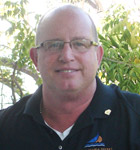Just out of law school, Frank Steeves—today executive vice president, general counsel, and secretary for Emerson Electric Co.—worked for the Juvenile Division of the Wisconsin State Public Defender’s Office. He’s done a lot since then: He was a successful trial lawyer. He led the charge to build a monumental children’s science museum. He spent a day with a US Supreme Court justice and also watched President Obama’s inauguration while abroad, alongside the chief justice of Mexico (just some of the perks of being a “GC” for a major corporation). But he still considers his time working in the juvenile court system the most eye-opening year of his life.
 “It was ground zero,” Steeves says. “I was shocked at how much bad stuff went on that wasn’t in the newspaper.” Having lived a “somewhat sheltered” life up until then, growing up in Vermont, Steeves says his work with high-risk children in “impossible circumstances” left him shell-shocked. “I realized that parenting varies wildly between households, and that’s a generous statement. Some parents didn’t care or didn’t have the knowledge to provide the kind of support that was needed for those young people.”
“It was ground zero,” Steeves says. “I was shocked at how much bad stuff went on that wasn’t in the newspaper.” Having lived a “somewhat sheltered” life up until then, growing up in Vermont, Steeves says his work with high-risk children in “impossible circumstances” left him shell-shocked. “I realized that parenting varies wildly between households, and that’s a generous statement. Some parents didn’t care or didn’t have the knowledge to provide the kind of support that was needed for those young people.”
Flash-forward three decades later, just before joining Emerson. Steeves was walking down Wisconsin Avenue late one evening when a well-dressed African-American man stopped him. “He told me that when he was 11 years old and in trouble for neighborhood burglaries, I went to his home and worked with his grandmother to get him back in school and keep him out of juvenile detention,” Steeves recalls. “He told me that he had stayed in school and had become a partner in PricewaterhouseCoopers. That moment was the best moment of my entire career.”
Higher Learning
The son of a university professor of education and an elementary-school teacher, Steeves was raised in a household where learning was the common currency. “I love the ability to experience and understand new subject matters and the opportunity to give others the same experiences,” he says. One imagines his upbringing conditioned his desire to cultivate young people, yet his ability to get through to youth seems almost innate. “I try to treat everyone regardless of age as an important, separate individual—a human being—and kids pick up on that pretty fast. They’re being treated with respect,” Steeves says.
Combining his childlike zeal with a love for sailing, one of Steeves’s top achievements was building a 137-foot-long semester at sea sailing vessel and serving as chairman during the founding of a children’s technology and maritime museum in Milwaukee. He did so while working as partner for von Briesen & Roper. “What began as an idea in my office changed over 15 years into a $135 million museum project,” he says. Steeves remained chairman or cochairman until resigning to join Emerson in 2007.
To this day, Steeves teaches university classes occasionally. He has lectured at Washington University’s law school on career development and taught a course in the MBA program, Intersections: Where Law Meets Business.
Steeves’s proclivity for mentoring led him to implement Emerson’s law-clerk program, a rarity for a corporate-law department. The program leverages the research acumen of young lawyers (“Students make us work better,” he says) and serves as a training ground; most clerks earn a job at Emerson or at one of the company’s law firms at the culmination of their service.
Taking Flight
For an aerial view of Steeves, look no further than his seaplane, which he flies as often as he can to places as close as Lake of the Ozarks in Missouri and as far as Key West, Florida. He renewed his flying license after moving to St. Louis where Emerson is headquartered. It helped him adjust to life in a new town. “I gave up friends in Milwaukee. You have to create a new circle. That’s hard in your early 50s to do that. But what you gain is a magnificent set of new experiences and meeting a new set of extremely high-quality people.”
Steeves touts Emerson Electric as “one of the greatest organizations on the planet,” and with good reason. The 115-year-old, 140,000-employee global engineering and technology company is known as one of the best-managed corporate conglomerates, with books written on its approach. Its main products involve control systems for oil and gas producers, manufacturers, and network-power delivery. It also works in the telecom and data-centers industries, and has an appliance and tools group.
In Steeves’s capacity as chief legal counsel, he leads a team of 250—lawyers, engineers, patent specialists, security officers, and more. He oversees attorneys in 15 countries. The breadth of responsibility and geography means he jet sets from India to China to Istanbul to Dubai, a pace that keeps him engaged and on the ball. Of late, Steeves has modernized the company’s international trade programs, in addition to ensuring it has strong programs protecting its intellectual property.
Being Frank
Randall D. Crocker, president of von Briesen & Roper, S.C., has known Steeves since 1976, when they met as law students at Marquette University. “[Steeves] has the curiosity of a teacher and the drive of a lawyer,” Crocker says, noting that those two factors combine to form a character that “gets things done.”
Perhaps more than anything, Frank Steeves is known for his direct, inquisitive approach—and his frankness: “He knows what the essence of the thing is. He knows the thing that needs to be handled. He can cut to the chase; he does not beat around the bush,” Crocker says.
Case in point: When leaders at Emerson Electric were stuck determining whether to continue an investment in the Russian market, Steeves was impelled to seek out answers in person. “He got on an airplane and went to Siberia and met with the people on the ground to get a firsthand understanding of who the people were, what the situation was, what the risks involved were,” says Ed Monser, president and chief operating officer of Emerson. “He came back with a willingness to try something he wouldn’t have been able to if he hadn’t gotten personally involved.”
Ultimately, Steeves is driven by a quest for facts. It’s one of the habits he picked up while working for law firms. “There is always a solution there; it’s just not always obvious. At the darkest moments, when things really seem like they are against you, the key is to keep studying the problem and looking at different angles,” he says. “Persistence is good. Shedding preconceived notions is good. And those rules apply to a lot of things besides cases.”

